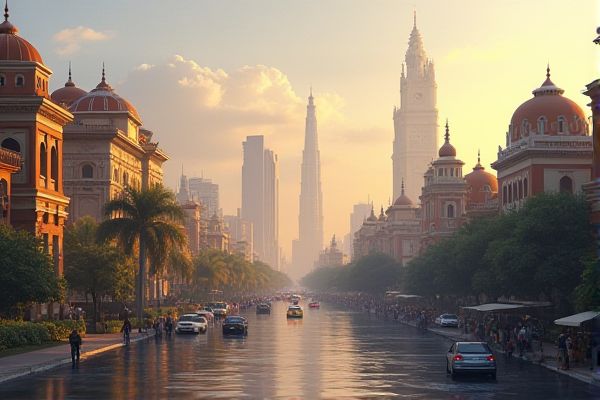
Insights from India residents and expatriate communities: Cultural diversity and rich traditions. Language variations and regional dialects. Spice-rich and diverse cuisine. Climate varies by region. Affordable cost of living. Complex bureaucracy and paperwork. Vibrant festivals and public holidays. Warm and hospitable locals. Expanding tech and job opportunities. Health and safety considerations.
Cultural diversity and rich traditions.
Indian culture is a rich and diverse heritage, influenced by several millennia of history, with varied languages, religions, dance, music, architecture, and customs. It celebrates numerous festivals, including Hindu, Muslim, Christian, and other religious holidays, and is preserved both within India and by expatriate communities through cultural events, education, and community engagement. For more in-depth information, you can refer to the Culture of India page.
Language variations and regional dialects.
In India, Hindi, the official language, encompasses a diverse array of dialects, including Western Hindi (e.g., Braj Bhasha, Haryanvi, Bundeli) and Eastern Hindi (e.g., Awadhi, Bagheli, Chhattisgarhi), each with distinct vocabulary, grammar, and pronunciation, reflecting the linguistic diversity across the Hindi Belt.
Spice-rich and diverse cuisine.
Indian cuisine is renowned for its spice-rich and diverse nature, with regional variations such as North India's dairy-rich curries, South India's coconut and lentil-based dishes, and the use of unique spice blends like Garam Masala, which vary across different regions to reflect local culinary traditions and flavors.
Climate varies by region.
The climate of India varies significantly by region, spanning from tropical in the south to temperate and alpine in the Himalayan north. The country hosts distinct climatic zones such as arid, semi-arid, subtropical, and continental climates, each influenced by geographical features like the Himalayas and the Thar Desert. These variations create a unique blend of weather patterns that impact not only the local ecosystems but also agriculture and lifestyle across the nation. For further insights into these diverse climatic conditions, you can explore the details on the Climate of India page.
Affordable cost of living.
The cost of living in India is significantly lower compared to many other countries, with monthly expenses for one person averaging around PS299-PS303 without rent. Cities like Kolkata and Pune are more affordable than Mumbai or New Delhi. Expats can enjoy a relatively luxurious lifestyle due to the low costs, with options for affordable housing, dining, and transportation. For more detailed insights on expenses and financial tips, visit the Wise Blog.
Complex bureaucracy and paperwork.
India's bureaucracy presents significant challenges for expatriates, particularly when navigating local bureaucracy, obtaining visas, and opening bank accounts. These processes are often frustrating due to inefficient systems and a lack of comprehensive online government services. According to Expat Insider, India ranks poorly in Admin Topics and Digital Life, with many expats finding it hard to deal with these bureaucratic hurdles. The cumbersome and outdated procedures can leave new arrivals feeling overwhelmed and can be a major obstacle to settling smoothly in the country.
Vibrant festivals and public holidays.
India is renowned for its vibrant and diverse festivals, which are celebrated by people from all communities, characterized by traditional songs, music, dances, and the use of colorful decorations, with festivals like Holi, Diwali, and Vaisakhi being significant across different regions and religions. These festivals, along with public holidays such as Republic Day, Independence Day, and Gandhi Jayanti, reflect the country's rich cultural and religious diversity. For more detailed insights, visit the Festivals of India page on WorldAtlas, which beautifully encapsulates the essence of these celebrations.
Warm and hospitable locals.
India is renowned for its warm and hospitable locals, with experiences highlighting the welcoming spirit of Indians, who often go out of their way to help and include visitors in cultural celebrations and daily life, embodying the phrase "Atithi Devo Bhava" (The guest is God). Indian hospitality is characterized by treating guests with reverence, offering abundant food and care, and engaging in personal conversations as a sign of genuine care, though this can sometimes lead to cultural misunderstandings. Stories of Hindi hospitality and horizons in India can be explored further through this insightful webpage.
Expanding tech and job opportunities.
The tech sector in India is undergoing significant transformation driven by emerging technologies such as AI, data science, machine learning, and cybersecurity, resulting in a growing demand for skilled professionals. Over the next few years, the industry is expected to generate approximately 1 million new job opportunities. The vibrant tech job market offers numerous opportunities in sectors including fintech, cybersecurity, and AI, with various benefits and flexible work arrangements. This attracts both local and expatriate talent to fill roles across the country in major cities like Mumbai, Bengaluru, and Chennai. For more information on companies hiring in the tech industry, visit Companies Hiring Tech Now In India for current opportunities.
Health and safety considerations.
Residents and expatriates in India should exercise caution by drinking only bottled water and avoiding ice to minimize health risks, as well as being mindful of food choices to prevent stomach upset. Common health hazards in the country include malaria, dengue fever, hepatitis, tuberculosis, and pneumonia. Fortunately, private hospitals in major cities provide healthcare facilities that are comparable to those in Western countries. For more detailed information, you can visit the Expatriate Healthcare website.
